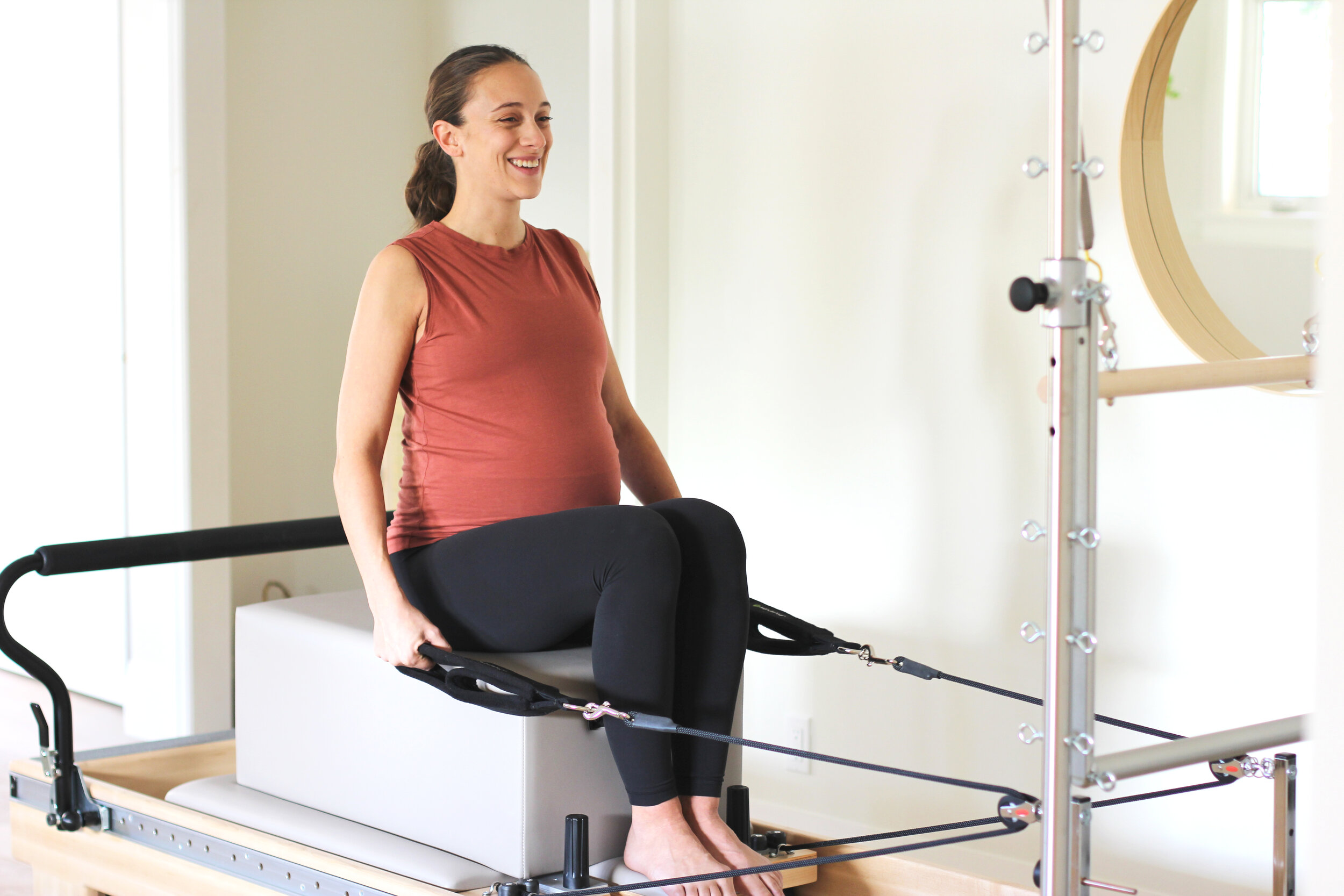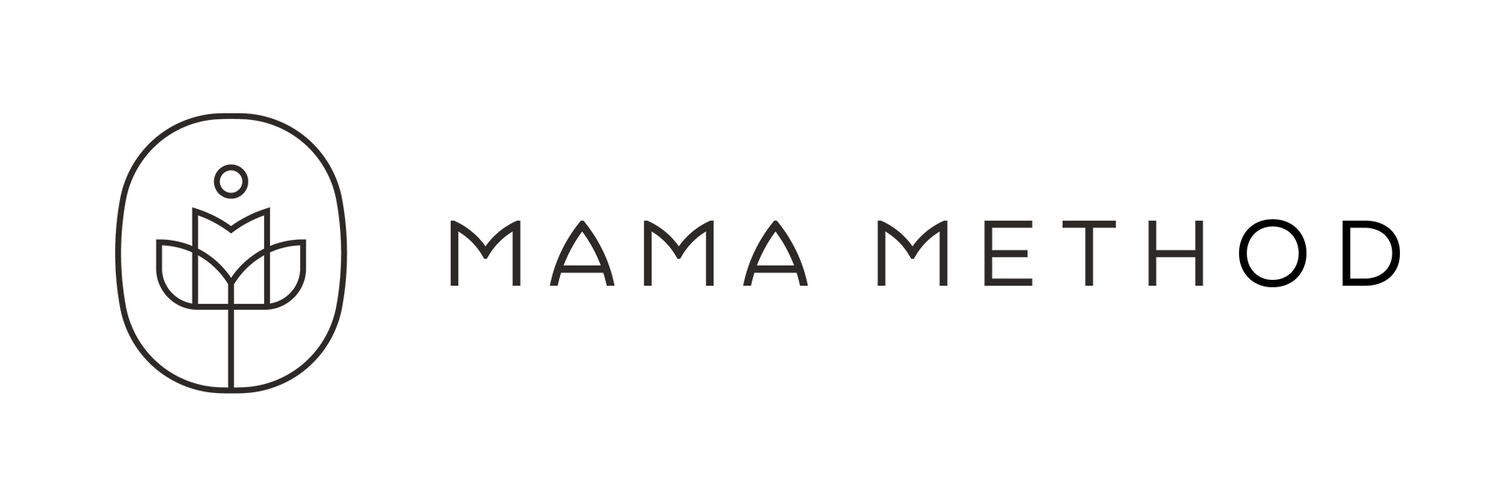
PRENATAL PILATES + FITNESS FOR ALL TRIMESTERS
Congrats, Mama! Let’s get you feeling strong + prepared for the biggest marathon of your life.

You’re pregnant! Woop woop! Studies show that moderate exercise is safe and beneficial for both mother and baby, and it’s no secret that Pilates is our go-to as it ticks off all the boxes, mostly being:
Non-impact
Meditative
Efficient for great breathing + deep core connections
Improves body alignment, posture, strength + mobility
Pregnancy related conditions, such as an incompetent cervix, bleeding, placenta previa and others may require you to limit exercise entirely. Always be sure to talk to your health care provider before starting a new exercise program.
How much exercise is too much, or too little?
Some studies suggest that an optimal exercise session in healthy normal weight woman is 30-45min @50-75% max Vo2 (intensity) followed by at least 15min of recovery. If we are entering pregnancy at a relatively fit state, then at what stage do we need to start modifying?
Let’s look at important things to monitor in each stage of pregnancy.
1st Trimester
Fatigue, nausea and vomiting may ask you to slow down considerable. Try not to worry too much, just adjust your intensity and duration to what feels right. Now is the time to start paying attention to posture and incorporating mid back mobility, lateral rib expansion + proper breathing strategies every single day. All 4 will help with both the Pelvic Floor and core, as well as managing and preventing general aches and pains.
2nd Trimester
The 2nd trimester is usually when most women need to start changing or modifying their strategies. 1st time Moms will usually start to see loading issues towards the end of the 2nd trimester but for 2nd time Moms this will likely happen sooner.
For instance, single leg squats may have felt fine for the first 3-5 months, but suddenly they’re causing SI joint pain. Or you may notice some ‘puffing’ or doming in the midline of your abdominals, when it wasn’t a problem weeks before. Baby is changing pressure on the abdomen so we need to watch for pressure compensations and learn how to manage Diastasis Recti.
Here are 3 things to monitor carefully:
Bearing down, puffing of the abdominals or doming of the linea alba. These are all signs the task is beyond what the core can handle and it’s time to modify.
The Lower Abs. We have 3 regions of the deep core: lower, middle and upper. Even if the middle and upper are firing well, if we see bulging in the lower region we know pressure is going down to the PF and it’s time to change things up.
Feelings of heaviness, difficulty starting urination or fully eliminating a bowel movement. Be proactive to prevent potential PF issues! Be sure to check in with a Pelvic Floor PT.
Keep in mind, even if you are doing everything right, there may still come a point in your pregnancy where you’ll need to dial things back a little, or even a lot. Try and remember this is a short period of time. Your goal is to prevent potential issues and keep your body feeling happy and pain free.
3rd Trimester
We are still monitoring all the things above, while increasing midback mobility, chest stretches and posture check ins. Now is a great time to incorporate meditation + relaxation techniques, as well as perineal massage.
Prevention!
Here are some tips to help prevent unnecessary stress on your body.
Maintain a great 360 breathing pattern with lots of back and side body expansion (decrease stress off linea alba).
Maintain a great deep beathing pattern to take stress off of the Pelvic Floor.
Back off at first sign of poor loading.
See a Pelvic Floor Physiotherapist to learn how to relax your Pelvic Floor to decrease tearing during birth.
No straining to go #2 – constipation is a big cause of prolapse!
Some Tips for Success
Stay hydrated + eat a small snack 15 min prior to exercise.
Watch out for over-heating, especially in the 1st Trimester.
Take breaks when you need.
Be prepared to modify things month to month as your pregnancy progresses.
LET’S GET STARTED
Please note: Jen’s schedule is currently at capacity; however, a number of spots are specifically reserved for new clients each week. To be notified of these openings, please join our waitlist and we’ll move you into a spot as soon as possible - typically 1-3 weeks.
To see if any openings are available, click here.
PRIVATE SESSIONS
Work one-on-one, in person with Jen at the private MAMA METHOD™ studio in North Burnaby. We’ll customize a program unique to your prenatal needs and goals to help you keep moving and feeling amazing right up until birth.
VIRTUAL GROUP SERIES
***Currently not in session*** For those wanting real-time feedback, accountability and weekly progressions, join our Prenatal Essentials cohort, a virtual 5 week series to set you up with a strong foundation to move safely and confidently throughout your pregnancy.
“As a first time pregnant woman, I was nervous I would lose strength from not being at the gym, but Jen was able to help me build strength, work on my posture, and develop a mind-body connection with my pelvic floor and core. Her classes offer a great balance of challenge and rejuvenation, and she's able to observe any tightness or fatigue and offer opportunities to lengthen and strengthen.” - Betty
“Jen is patient, adaptive and a great motivator. Being pregnant I was worried about back pain, stiffness and gaining too much weight. She was able to help calm my fears by sharing her experiences and tips. She’s been able to help me understand the changes my body is going through, provide me with at home exercise to relieve aches and pains, as well as working on my strength for recovery after birth.” - Willa
“Jen is so patient and knowledgeable, and really cares deeply about the well-being of her clients. Early in pregnancy I developed pelvic pain which Jen was able to pinpoint and helped to alleviate the pain. I truly enjoy every one of our sessions. I highly recommend her to anyone looking for prenatal and postpartum Pilates to help with support and recovery!”
- Tina




